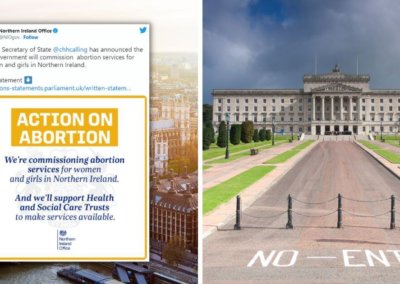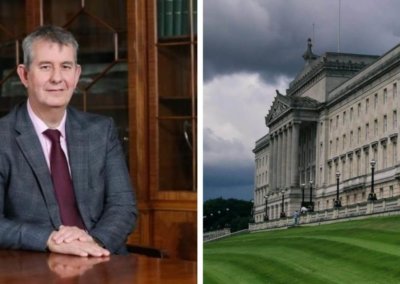A number of Peers have spoken out against the Government’s new regulations that give the Northern Ireland Secretary, Brandon Lewis MP, sweeping new powers to impose expanded abortion access on Northern Ireland, raising grave concerns about the undermining of the Good Friday agreement and the devolution of power in Northern Ireland.
In a debate opposing giving the new powers to the Northern Ireland Secretary, Baroness Nuala O’Loan said: “Despite the fact that a duly elected and appointed Northern Ireland Minister of Health is in office and working, we see an attempt to bypass him and give the Secretary of State for Northern Ireland powers that are not available to Northern Ireland Ministers or their government departments”.
Baroness O’Loan argued that the Abortion (Northern Ireland) Regulations 2022, which MPs approved on Wednesday, “disregard the statutory role of the Northern Ireland Assembly and ignore the devolution settlement”, and “make substantial constitutional changes by way of secondary legislation”.
Baroness O’Loan drew particular attention to the Ministerial Code in Northern Ireland that requires Northern Ireland Ministers to bring “significant or controversial matters” to the attention of the Executive Committee in Northern Ireland. The Baroness said: “Abortion is a significant, controversial matter”.
Additionally, she said that “the regulations give broad, sweeping powers to the Secretary of State effectively to act as a Northern Ireland Minister without having been appointed as a Minister in accordance with the provisions of the Good Friday agreement and the Northern Ireland Act 1998 and without any accountability to the people of Northern Ireland”.
Several other peers voiced their concerns about the regulations with Lord Alton of Liverpool stating that “All the other rights are worthless without that paramount right to life”.
On Wednesday, the House of Commons voted to give the Northern Ireland Secretary, Brandon Lewis MP, sweeping new powers to regulate abortion in Northern Ireland, despite the fact that the region has a sitting Health Minister, Robin Swann.
The regulations were approved by MPs by a vote of 215 to 70. Given that the Government had brought them forward, it was expected that they would pass, as large numbers of Conservatives would support their own Government’s regulations, but the number of MPs that supported them was far less than in 2021 when similar abortion regulations for Northern Ireland were brought forward. In that vote, 431 MPs supported the regulations, whereas on the vote on Wednesday, only 215 voted in support.
Abortion in Northern Ireland
Polling from 2020 showed that the majority of voters only want abortion to be available in cases where the mother’s life is at risk, a position in line with the law before the Westminster Parliament imposed a change on Northern Ireland.
Northern Ireland was the last region of the British Isles to have widespread abortion introduced into the country. It is estimated that 100,000 people are alive in Northern Ireland today who would not have been if abortion were available as it was in the rest of the U.K. This figure was confirmed by the Advertising Standards Authority in 2017.
Right To Life UK spokesperson, Catherine Robinson, said: “The procedural changes to the Northern Ireland Act implied by these new regulations make a mockery of the idea of devolution. These changes to the Northern Ireland Act should be presented before Parliament so that a full debate on such matters is possible”.
“Abortion has been imposed on a region whose population and Government do not want it. Normal parliamentary procedure and debate seem to have been side-tracked in the pursuit of promoting abortion. As always, women and their babies are the ones who lose out most”.












